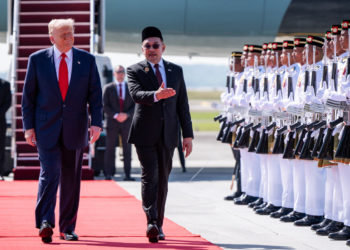President Trump’s decision to bomb three nuclear sites in Iran has prompted accusations that he violated the Constitution by carrying out an act of war without congressional authorization. The dispute underscores a split between the apparent intent of the Constitution and how the country has been governed in practice.
While most legal scholars agree that the founders wanted Congress to decide whether to go to war unless the country is under attack, presidents in the modern era have carried out military strikes without authorization from lawmakers. Courts have shied away from weighing in, and Congress has acquiesced rather than impeaching those presidents.
“Was the Iran strike constitutional?” Jack Goldsmith, a Harvard law professor and former senior Justice Department official in the George W. Bush administration, said on Monday. “I don’t know because the constitutional law of war powers is inscrutable.”
Here is a closer look.
What has happened?
Mr. Trump ordered the American military to bomb Iranian nuclear sites, without seeking congressional authorization or claiming there was evidence of an imminent threat.
Threatening further escalation, Mr. Trump has warned Iran that he will respond with more bombings if it strikes back, while musing about pushing for a change in government. But after Iran launched missiles on Monday at a U.S. base in Qatar, Mr. Trump said Iran had given advance warning and there were no injuries. He suggested he wanted to de-escalate.
Critics are accusing Mr. Trump of violating the Constitution. For example, Senator Tim Kaine, Democrat of Virginia, said on Fox News Sunday, “It’s unconstitutional for a president to initiate a war like this without Congress.”
Republicans have generally been supportive or silent, though Representative Thomas Massie, a libertarian-leaning Kentucky Republican, wrote on social media that “this is not constitutional.” Mr. Trump responded fiercely, saying he will back a primary challenger to Mr. Massie, a clear warning to other Republicans who may be considering criticizing his move.
What does the Constitution say?
The Constitution says Congress has the power to “declare war,” while it makes the president the “commander in chief” of the military. Most legal scholars agree that the founders intended to separate the power to initiate a war from the power to run a war once it has begun, leaving the president able only to repel sudden attacks without first going to Congress.
In the Federalist Papers, Alexander Hamilton wrote that the American president, while commander in chief of the armed forces, would have less power than the British king since a president could not declare war “on his own authority” like a monarch could.
The Constitution also makes ratified treaties the “supreme law of the land.” The United Nations Charter, a treaty that the Senate ratified after World War II, says that except in self-defense, a country may only attack another country if the U.N. Security Council has authorized it.
What has happened in practice?
In the early and middle part of American history, presidents generally got authorization from Congress for dispatching American troops into offensive action abroad. But especially since the end of World War II, when the United States maintained a large standing army, that has not always been the case.
While presidents since the end of the Cold War have obtained congressional authorization for major land wars — the Gulf War, Afghanistan and Iraq — they have also increasingly asserted a right to carry out more limited interventions, especially airstrikes, without going to Congress.
What is the view from the executive branch?
Executive branch lawyers have argued that the president, as commander in chief, may use military force unilaterally if the president decides a strike would be in the national interest and its anticipated nature, scope and duration fall short of “a ‘war’ in the constitutional sense,” as a Clinton administration lawyer wrote in considering intervention in Haiti in the ’90s.
Lawyers under the first Trump administration endorsed that view in a 2018 memo that justified Mr. Trump’s attack on Syrian government forces after it used chemical weapons. It said Mr. Trump could lawfully and unilaterally direct the airstrikes because he determined that doing so would be in the national interest, and because the attack would carry little risk of escalation.
“Given the absence of ground troops, the limited mission and time frame and the efforts to avoid escalation, the anticipated nature, scope and duration of these airstrikes did not rise to the level of a ‘war’ for constitutional purposes,” wrote Steven A. Engel, then the assistant attorney general for the Office of Legal Counsel.
The second Trump administration has not issued a detailed explanation of why it thinks it was lawful for Mr. Trump to attack Iranian nuclear sites. But at a press briefing on Sunday, Pete Hegseth, the defense secretary, gestured toward similar reasoning, while also invoking a claim of self-defense.
“This mission was not and has not been about regime change,” he said. “The president authorized a precision operation to neutralize the threats to our national interests posed by the Iranian nuclear program and the collective self-defense of our troops and our ally Israel.”
What’s the critique of the executive branch view?
It has proved impossible to get any definitive court resolution of whether the theory from lawyers in the executive branch is correct. Judges typically dismiss lawsuits against unilateral presidential military operations by saying that the plaintiffs have no right to sue and that such matters raise a “political question” that the two elected branches must work out among themselves.
But at the broadest level, critics of this view think that presidents of both parties have violated the Constitution, and that just because Congress in the past effectively acquiesced — by not impeaching them — that should not be seen as precedents that justify more breaches.
During recent presidential primary campaigns, The New York Times has asked would-be presidents to answer detailed questions about their views of executive power, including the scope of their war powers if elected. Mr. Trump did not respond to that survey in the 2016, 2020 or 2024 cycles.
But as a Democratic presidential candidate in 2020, Tulsi Gabbard, now the director of intelligence, said she disagreed with the Office of Legal Counsel’s reasoning, writing: “The president must seek congressional authorization for actions beyond an immediate response to an injury of threat of it.”
And as a challenger to President Joseph R. Biden Jr. in the 2024 election, Robert F. Kennedy Jr., now Mr. Trump’s health and human services secretary, wrote, “Except in cases of imminent danger to the nation, a president must be constrained in war-making through the check and balance of congressional authority.”
One such check, Mr. Kennedy added, is impeachment.
Is attacking Iran ‘war’ in the constitutional sense?
Some people who agree that the Constitution sometimes lets presidents carry out limited strikes without going to Congress have argued that bombing Iran’s nuclear sites is different. Attacking Iran, they say, would be much more dangerous, carrying too much risk of escalation into a major armed conflict for one person to decide.
In the Times’s executive power survey during the 2020 cycle, Mr. Biden defended the executive branch’s general view that presidents can, on their own, authorize strikes that are short of “war” in the constitutional sense. But he suggested that prior congressional permission would be constitutionally necessary to bomb Iran.
“Any initiation of the use of force against Iran or North Korea — unless in response to an imminent attack — could certainly result in a wide-scale conflict and constitute a ‘war’ in the constitutional sense that would require authorization by Congress,” Mr. Biden wrote.
What about the War Powers Resolution?
In 1973, at the end of the Vietnam War, Congress tried to reclaim some of its eroding authority by enacting the War Powers Resolution, overriding a veto by President Richard M. Nixon. It says a president may only introduce forces into hostilities with congressional authorization or if the United States has been attacked.
But it also requires presidents to terminate deployments after 60 days if they lack authorization, which could suggest that one-off strikes and brief operations are allowed. Presidents of both parties have acted beyond the statute’s purported constraint about when they may launch an attack, seeing it as unconstitutionally narrow.
While the law is widely considered a failure, it remains on the books, and critics of Mr. Trump’s move are trying to invoke part of it to at least force a vote on his war with Iran. Mr. Kaine in the Senate, and Mr. Massie in the House along with Representative Ro Khanna, a California Democrat, have introduced a resolution that would direct Mr. Trump to end hostilities with Iran.
Even if it passed the Republican-controlled Congress, however, Mr. Trump could veto it.
Charlie Savage writes about national security and legal policy for The Times.
The post Was Trump’s Iran Attack Illegal? Presidential War Powers, Explained. appeared first on New York Times.




